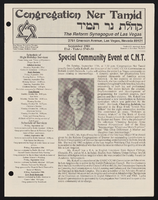Search the Special Collections and Archives Portal
Search Results

LaPalm Motel Neon Survey document, September 10, 2017
Date
Archival Collection
Description
Site address: 2512 Fremont St
Sign owner: La Palm Motel Inc
Sign details: Property originally constructed in 1963 on 0.33 acres.
Sign condition: 3 - the sign is in decent condition and appears worn from weather. It is unclear if the sign still lights up at night.
Sign form: Roadside pole sign
Sign-specific description: This pole roadside sign has a simple design. A large black pole supports the other elements for this sign. The top portion of the sign features a plastic, backlit sign reading "La Palm" in a black, serif text. Underneath the "lm" of the "La Palm" sign is a series of open channel letters spelling out "MOTEL" against a faded teal background. This portion of the sign is also a thin, rectangular shape allowing for an open space between the "MOTEL" of the sign and the pole that supports it. Underneath the "L" of the "MOTEL" is the bottom portion of the sign that is attached to the pole. This portion of the sign features a plastic, backlit sign reading "DAILY WEEKLY CABLE TV POOL KITCHENETTES LAUNDROMAT" in bold red letters against a white background. Under this is the word "VACANCY" painted in bold white text. Neon tubes spell out "NO" and outline "VACANCY." Along the outer edge of this sign facing Fremont, the sign is painted a pale yellow with incandescent light bulbs lining this section.
Sign - type of display: Neon, indandescent, backlit
Sign - media: Steel and plastic
Sign - non-neon treatments: Paint
Sign environment: This property sits at the corner of East Charleston and Fremont in an area filled with many other smaller motels. There is a Pepe's Taco and Lowe's Home Improvement that close to this motel.
Sign - date of installation: Possibly c. 1963
Sign - thematic influences: There is no exact theme replicated in this sign. It does look similar to other motel signs throughout the city since it sits directly along the roadside allowing motorist and pedestrians to see it easily.
Sign - artistic significance: This sign is a standard example of motel signage because it features the basic elements of a roadside motel sign. It has the name of the property, the word "motel", and other amenities that they may offer.
Survey - research locations: Assessor's website
Survey - research notes: http://www.roadsidepeek.com/roadusa/southwest/nevada/vegas/lvmotel/lvdownmotel/index4.htm
Survey - other remarks: There is not a date of any specific redesign of this sign; however, based on an earlier image of this sign the font in the "La Palm" portion of the sign did change somewhere along the way during the time this property has been around.
Surveyor: Lauren Vaccaro
Survey - date completed: 2017-09-10
Sign keywords: Neon; Incandescent; Backlit; Steel; Plastic; Paint; Pole sign; Roadside
Text

Paul M. Lytle interview, March 8, 1995 transcript
Date
Archival Collection
Description
Lytle discusses his birth in Salt Lake City, Utah, his early life in Overton, Nevada, moving around the Southwest United States, and returning to Overton in the early 1930s to work with the Civilian Conservation Corps. Subjects Lytle also talks about in the interview include road and campsite construction at the Valley of Fire State Park, stories about associates and relatives, and being enlisted as a male nurse with the United States Army during World War II. Lastly, Lytle talks about the construction of an exhibit building at Hoover Dam (Boulder Dam) originally used as a headquarters for soldiers during World War II to protect the dam.
Text
Bella Tyktin Stern Photographs
Identifier
Abstract
The Bella Tyktin Stern Photographs contain black-and-white photographs and negatives of Bella Tyktin Stern in locations around Las Vegas, Nevada from 1943 to 1960. The locations include Mt. Charleston Ski-Bar Ranch, the Last Frontier Hotel, Scotty's Castle in Death Valley, California, the Grand Canyon, Arizona, and Valley of Fire, Nevada.
Archival Collection
Alan Cummings Research Files
Identifier
Abstract
The Alan Cummings Research Files (1974-2004) are comprised of research files compiled by Cummings, an elementary school teacher for the Clark County School District (CCSD) in Southern Nevada. The files represent Cummings's work to persuade the Teacher's Health Trust, the employee benefit plan for the school district, to consider domestic partnership benefits for CCSD educators and administrators. Materials include personal correspondence, newspaper clippings, magazines, and court cases.
Archival Collection
Golden Agila Lions Club Records
Identifier
Abstract
The Golden Agila Lions Club Records (1996-2019) contain organizational and membership files for the Golden Agila Lions Club, a Filipino-American civic organization based in Las Vegas, Nevada. The collection includes information about chartering the organization as an official club and includes membership lists, newsletters, and records that document the Golden Agila Lions service and social activities. The collection includes newspaper clippings documenting the Golden Agila Lions Club and the Filipino community from various Las Vegas-based Filipino and Asian-American newspapers. Two issues of
Archival Collection
Josiah Edward Spurr Papers
Identifier
Abstract
Collection consists of an original manuscript, "Geology and Ore-Deposition at Tonopah, Nevada" by Josiah Edward Spurr (1870-1950) with hand-drawn diagrams, and letters discussing the donation of the manuscript. The manuscript, which was published in the journal Economic Geology in 1915, is a geological description of the Tonopah mining area; the Tonopah Mining Company is mentioned frequently. It is undated, but the publication date suggests it was written approximately 1913-1915.
Archival Collection
Ron Lurie Papers
Identifier
Abstract
The Ron Lurie Papers are primarily comprised of photographs, newspaper clippings, and daily planners from 1972 to 1990 that document Ron Lurie's political career as a city councilman and a mayor of Las Vegas, Nevada. The collection also includes a small amount of correspondence and ephemera, mainly letters that were mailed to Lurie along with photographs. The photographs in the collection depict events and activities that Lurie participated in, and the newspaper clippings document city and state politics in addition to Lurie's political career.
Archival Collection

Jamey Stillings Resume / CV, June 17, 2016
Date
Archival Collection
Description
Text


